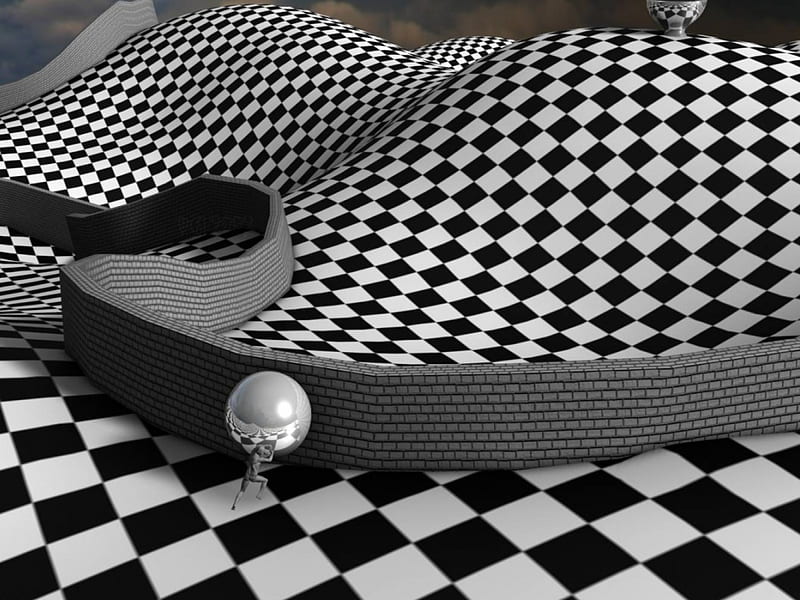What does it mean to live in a world that is made up of our assumptions? How does that even work? How practicable I think is this? The first thing to note that it is practicable – it is very practicable indeed, as it happens. Clearly it is since we do it all the time, without even knowing that we are. it’s no problem living in a world that is made up of our assumptions – not in the short term, at least.
Assumptions are created very easily – all that is needed is for us to ‘stop looking any further,’ so to speak. We switch off our attention. We assume – we say ‘this is it’ and then we get on with it on that basis. We’re in a hurry to get on with it anyway; we’re actually in a terrible hurry to get on with it; we’re as hasty as hell – it’s as if the devil himself were on our tail! This is all very well as far as it goes but there is nevertheless a very serious problem with what we have just done, albeit a problem that we can’t for the life of us see. It’s a ‘problem in waiting’, ‘a problem in the pipeline’. But whilst what we normally call ‘assumptions’ can very often rebound on us very swiftly and teach us a clear and to-the-point lesson in why we need to cop on and stop being such laughable dopes, assumptions we make ‘about what life is’ don’t do this – once we’ve made the assumption then we can’t ever see it for an assumption and when it does cause pain for us we always end up laying the blame something else and ‘misdirecting’ our fixing-type activity. We can’t actually bear to see the problem for what it is…
The problem that we can’t bear to see for what it is (and which gradually takes all the good out of life) comes into being because the assumptions that we have made are necessarily static, whilst the process we have interrupted by hastily ‘jumping to conclusions’ is not static. ‘Concepts are always frozen. Reality flows.’ says Anthony de Mello. This is going to create problems (obviously enough) because the essential element of reality – which is we might say it’s ‘non-static’ nature – is now missing, and we can hardly suppose that a deficiency in something as important as ‘the essential element of reality’ is not going to make itself known some point or other! This doesn’t mean that we will necessarily ‘spot our mistake’, however – not because the mistake in question is too hard to spot so much but more because (as we have just said) – on a very deep level we don’t want to.
To continue in this vein, we could say that the essential nature of reality is that it continually reveals itself, and yet there is never anything static about this, never any point at which something is ‘definitively revealed’. It is the movement, the unfolding, which is the essential element, not anything else, not any imaginary endpoint. The unfolding itself is ‘where it’s at’, not in any static ‘freeze-frame’ that we might seize hold of in our hurry to ‘say what things are’. So when we do take a frozen frame of the movie and attempt to run with it, attempt to pin meanings on it, attempt to find meanings in it and make a whole big show of it, and so on, we are headed for disaster. We’re doing a very dumb thing – we’re stopping reality doing what it does!
Consciousness – we might say – ‘operates in the dimension of the unfolding’; if there is no unfolding then there is no consciousness, it’s as simple as that. Just as you can’t fit the ocean into a sherry glass, you can’t fit consciousness into a freeze frame! It just can’t be done; it just isn’t going to happen. Just as there is no reality to unfold in the world that is made up of our assumptions, there is no consciousness either! We might be excused therefore for wondering what exactly goes on here in this freeze-frame of ours that we call reality. How come we don’t get fed up very quickly? How come the whole thing doesn’t just implode immediately out of sheer pointlessness?
There has to be some kind of reason why this doesn’t happen obviously. The situation is far more stable than we might have otherwise imagined it could be, it actually seems – on the face of it – to be ridiculously stable; it seems to go on and on forever without any problems whatsoever. It persists, no matter how absurd it might be. The flaws inherent in the system do show themselves in the end however – it’s just that they’re in no hurry to do so. They work themselves out in their own good time… The basic ‘problem’ with the world which is made up of our assumptions is that it isn’t actually kind of world at all; it isn’t actually any kind of world at all because it has ‘zero information content’. There’s nothing in it, it isn’t actually real. How does the deeply fatuous ‘assumed world’ get to be so very powerful, therefore?
The world that is made up of our assumptions is built up upon a set of impressions that we once received, but which – even back then – didn’t genuinely represent the reality they were supposedly telling us about. Even before we started up with our own arbitrary embellishments, our own game of ‘Chinese whispers’, the blueprint we started off with as an unquestionable foundation stone didn’t have any reality in it. The original picture never had any reality in it because there because no picture of reality, no ‘impression’ of reality, ever could have anything remotely real in it. It’s a bit like taking a fraction of a sentence out of context and then trying to recreate the conversation from which it arose. It’s a bit like that inasmuch as it can’t be done. We can’t recreate the reality that we have lost by thinking about it too much with yet more thinking. The truth is that we have shut a door, and – no matter what we might say – we never want to open it again.
We could very straightforwardly say that the world which is made up of our assumptions is the world that is made up not of what we know, but of what we think we know but don’t. We all know this definition of what is meant by ‘an assumption’: we have furnished the reality ourselves when actually there was none; there seems to be something there only because of our ‘neglect’, because of our abject failure to pay attention. This then is just another way of saying what we have said just a moment ago, which is that the world which is made up of our assumptions has ‘zero information content’ to it. This sounds like a ridiculously obvious statement to make but ‘information’ is not something that we understand very well, however. We usually get it completely backwards. We think that when someone tells us a fact then this is ‘information’ – that’s our idea of what information means. If we were to live in a ‘world made up of facts’ – as indeed we do – then this for us would be a world that is absolutely full of information absolutely chock-a-block with information. And yet the truth of the matter (if we were actually to care about such things as the truth) is that the exact reverse is the case! The world that is made up of facts is a closed world, a dead world, a hollow world – a ghost world that seems to be real for us only when we happen to be ghosts ourselves.
Information doesn’t come out of facts, it comes out of the ongoing process of never-ending ‘revealing’, as we have just said. The term ‘information’ corresponds not to some static representation of how things (supposedly) are, but to the ongoing process of unfolding that works by continually showing itself not to be what we had, up to that point, thought it to be. When a thing is what we had assumed it to be, then there is no information here, and when there is a contradiction instead of an agreement, and we learn that the thing in question very much isn’t what we had previously taken it to be, then this contradiction is itself the pure essence of information. This ‘disagreement’, this ‘contradiction’, this ‘structure-falsification’ is what information is all about.
Just by saying this therefore we can see that the way the thinking mind works is by getting rid of information. The TM operates on the principle of taking ‘agreement’ between incoming data and our prior ideas about the type of things that might be out there as being confirmation of something real, proof of something real. And when we say ‘agreement’ here we don’t just mean that the incoming data definitely fits into our pre-existing mental categories, we equally mean when it definitely doesn’t fit – this too is ‘an agreement’. Both ‘yes’ and ‘now’ answers constitute agreement because both confirm the validity of the model or theory lies behind the question that we’re asking. ‘Yes’ and ‘no’ are both facts; ‘yes’ and ‘no’ are what go to make up the black and white (or concrete) world that the TM creates for us.
If ‘yes versus no’ equals agreement, then when the incoming data is neither saying yes or no to the assumptions that we are making then this equals ‘disagreement’, or ‘non-validation’. ‘Neither yes nor no’ equals information therefore and information (because it is information) never confirms the validity of our mental categories. That’s the one thing it will never do. Information is for this reason a very unwelcome guest at the party! No guest was ever as unwelcome and so – consequently – no guest was ever defended against so thoroughly. We defend against ‘neither yes nor no’ by immediately rejecting it as error – it doesn’t fit in with our structures and so obviously it is an error. It’s so obviously anomalous that we never think twice about disregarding it in this way. When it comes down to it, we never think about it once either! We don’t reflect even for a billionth of a second on the fact that we are rejecting ‘neither yes nor no’ (or ‘neither up nor down’) as error and that’s what makes our defence against actual information so impregnable.
We maintain the integrity of the world that is made up of our assumptions by having absolute unreflective faith (‘blind faith’, so to speak) in our structures; blind faith in the given structure is our defence against ‘the ravages of information, therefore’. If we were in any way to question or look at what we have assumed this would be the end of it – our whole world would start to come tumbling down around our ears, but we never do look at the given structure and that is the saving’ of us, if we may put it like that, and this way we are ‘saved’ from reality! We are saved from reality by perfectly inverting the natural order of things; we maintain ‘the world that is made up of our assumptions’ by perfectly inverting the natural order of things such that reality becomes unreal for us at the same time as unreality becomes real, and this is why it is no problem at all (in the short term, at least) for us to be living in that world.
Needless to say, ‘being saved from reality’ isn’t all that is cracked up to be – it’s not quite the success story we make it out to be. We do our best to talk it up of course and – by and large – we believe our own hype, but this doesn’t mean that there isn’t a part of us that doesn’t know this existence of ours to be a fraud. Every now and again it happens that the fraudulence of what we are putting all our energy into promoting hits us in a way that we can’t ignore and when this happens we are generally said to be suffering from ‘clinical depression’; when we are suffering in this way our perception is very much that everything about us as a sham or a lie and that we have somehow turned by hundred and eighty degrees away from life, with the result that we are profoundly alienated from anything that actually has any meaning, and there never was a truer perception than this. There never was a truer perception than this but all of society’s experts will tell us will inform us with the greatest solemnity that there is something wrong with us, that there is a problem with the functioning of our brain, or the neurotransmitters in our brain. Naturally enough, we are quick to believe this – what are we going to trust, after all – our own feelings and intuitions, which are telling us something we absolutely don’t want to believe, or the authority of the qualified experts? Who are we going to believe – ourselves (mentally unwell as we are) or everyone else in the world? These mental health experts do seem very sure of themselves, after all – they have that skill, at least!
The puzzle isn’t why some people get depressed, or why it happens to some people that they get to thinking that life (for them at least) is no more than a futile thankless task that they don’t enjoy and which they are doomed to lose anyway – the puzzle is why this doesn’t happened to us all! The puzzle is how most of us seem to be getting along fine (or at least without any overly significant psychological distress) whilst at the same time managing successfully never to meet anything other than our own assumptions, reheated and served up to us again and again, day after day, without ever a break. How the hell do we do this? What’s our secret? There is after all no genuine ‘good feeling’ (or ‘genuine wholesomeness’) to be had in the world of our assumptions. How could there be – how can we have such a thing as ‘a genuine good feeling’ (or any type of genuine feeling, for that matter) when the basis of it is an assumption? We would be jumping the gun that case; we’d be building castles in the clouds. There is only the false type of good feeling (i.e. euphoria) to be had in the world that is made up of our assumption; there can’t any genuine type of good feeling because we are only feeling good (when we do feel good) on the basis of what we think is true, not what actually is true. There is only ‘false feeling good’, or ‘false feeling bad, to be had here (along with the false excitement, both positive and negative in flavour, that comes with our anticipation of either the one or the other). And this diet has got to be got to wear pretty damn thin at some stage.
This is such a bizarre situation to be in. If thinking about it doesn’t completely blow your mind, then this can only be because you haven’t understood it yet! Our basic premise – as we have said – is that what is real is unreal and what is unreal is real. We orientate ourselves around our ‘mind-created fictions’ in such a way that anything that doesn’t agree with them automatically gets disqualified as being nonsensical, anomalous, meaningless. And yet it is of course our mind-created fictions that are nonsensical, anomalous and meaningless, which we would immediately see for ourselves if we had the courage to actually look at them. The question arises therefore – why are we so very attached to our assumptions? Why are we so extraordinarily resistant to examining them? There’s nothing of any actual genuine value in them after all, as we have just said. One answer might perhaps be to say that we don’t like surprises, and that we would therefore much rather ‘stick with what we know’, no matter how insipid and limited that ‘known world’ might be. That’s one possible answer, but we can go a bit deeper than this.
The world that is made up of our assumptions has two ends – the ‘front end’ and the ‘back end’. The front end is composed of objects, all the commonplace things that we regularly relate to, the ‘defined environment’ that we devote all our attention to, whilst the back end remains completely inconspicuous. The back end of the world of our assumptions is who we think we are – it is the self. The self is the key assumption, the lynch-pin assumption behind all the others; the defined environment that seems so very ‘obvious’, so very ‘concrete’ to us, is nothing more than an reflection of that arbitrary way of seeing things. If we dropped that viewpoint (and there’s no good reason why we shouldn’t) then the picture of the world that we know so well would vanish in a flash, and we don’t want that to happen. But it’s not the external picture that we’re attached to so much as the self that is the back end of that picture – the assumption that we really don’t want to see through is ourselves!
Art- Philosopher in meditation, Rembrandt







Stefan
What Alfred Korzybski said.
Stefan
Some people cling more to the map than to their life. They’d rather commit suicide than let go the map.